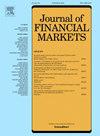分析师会提前发布负面意见吗?
IF 2.1
2区 经济学
Q2 BUSINESS, FINANCE
引用次数: 0
摘要
我们研究了分析师发表负面意见时的预测时机。当管理层隐瞒坏消息时,好消息会变得更多,但信息量相对较小。我们从理论上预测并通过实证证明,分析师会将观察到的坏消息视为具有更高的精确度,并通过发布比好消息预测更快、更准确的预测来应对坏消息。这些结果在各种稳健性检验中都是成立的。这项研究加深了我们对资本市场负面信息传播的理解。本文章由计算机程序翻译,如有差异,请以英文原文为准。
Do analysts distribute negative opinions earlier?
We examine analysts’ forecast timing when issuing negative opinions. When management withholds bad news, good news become more abundant but relatively uninformative. We theoretically predict and empirically document that analysts treat observed bad news as having higher precision and respond to it by issuing forecasts more quickly and accurately than for good news forecasts. These results hold to various robustness checks. This study improves our understanding of negative information dissemination in capital markets.
求助全文
通过发布文献求助,成功后即可免费获取论文全文。
去求助
来源期刊

Journal of Financial Markets
BUSINESS, FINANCE-
CiteScore
3.40
自引率
3.60%
发文量
64
期刊介绍:
The Journal of Financial Markets publishes high quality original research on applied and theoretical issues related to securities trading and pricing. Area of coverage includes the analysis and design of trading mechanisms, optimal order placement strategies, the role of information in securities markets, financial intermediation as it relates to securities investments - for example, the structure of brokerage and mutual fund industries, and analyses of short and long run horizon price behaviour. The journal strives to maintain a balance between theoretical and empirical work, and aims to provide prompt and constructive reviews to paper submitters.
 求助内容:
求助内容: 应助结果提醒方式:
应助结果提醒方式:


